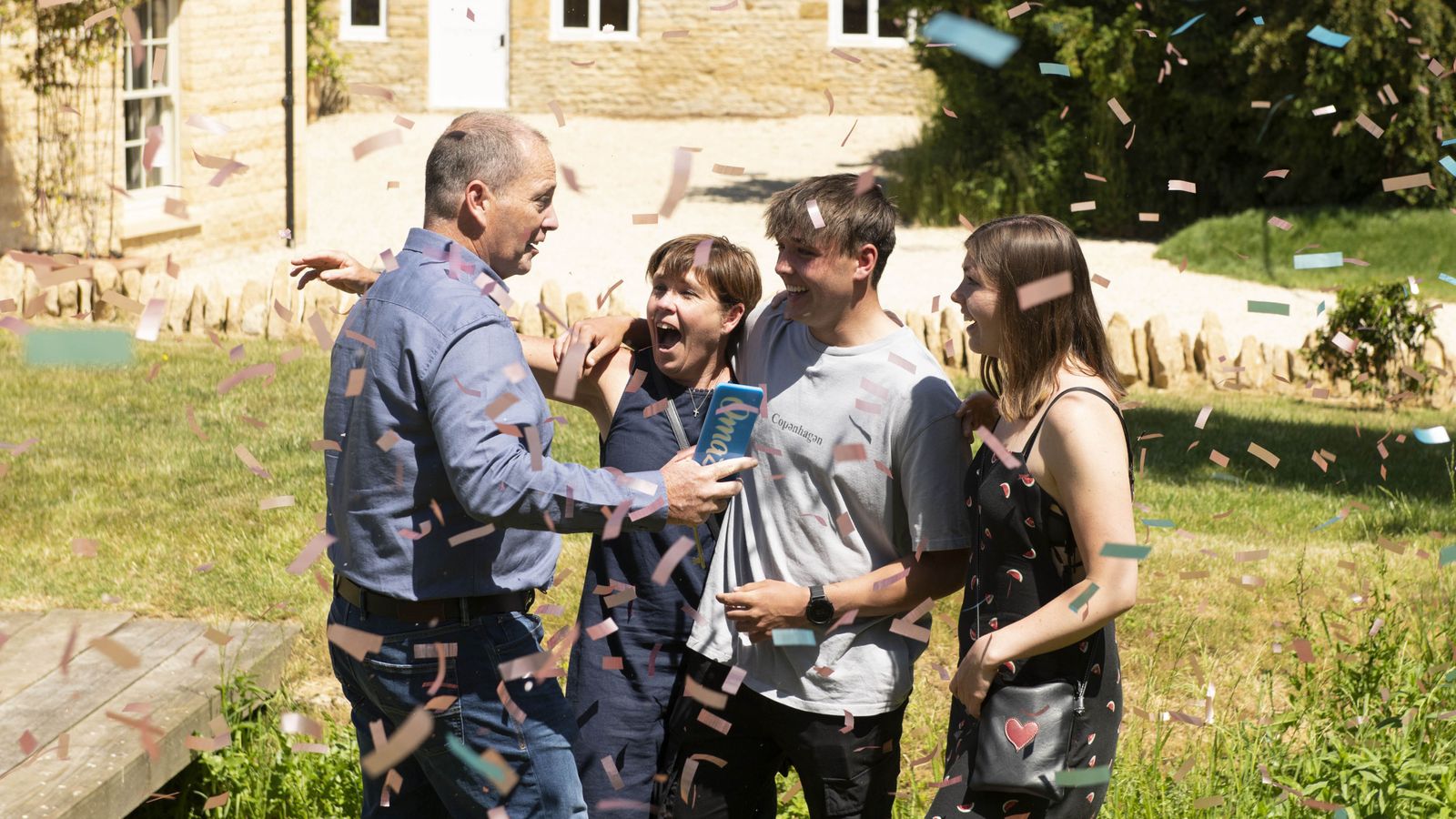In an increasingly grim housing market, the chance to own a once-in-a-lifetime home for the price of a £5 ticket seems too good to be true.
And that’s because it usually is.
But amid a cost of living crisis, it is the chance to “escape from reality” that drives people to continue gambling on a win, one psychology expert has told Sky News.
This week, a woman who thought she had won a £2m villa in Nottingham was left “heartbroken” after the small print meant she had won £5,000 instead.
Loretta, a teacher, was over the moon when a representative from Win My Home visited her to say she had won the grand prize – but this turned out to be just 0.25% of what was advertised.
Competition organisers said they had actually made a loss, and the prize was a gesture of goodwill.
Where did housing raffles come from?
Housing raffles first cropped up in 2008, as a way to beat the economic slump, when a couple from Devon raffled off their £1 million estate at £25 a ticket.
Then in 2018, Win a Country House sparked a revival of the trend, and more recently Omaze has been combining it with fundraising, promising entrants both the chance of winning a luxury property and a warm fuzzy feeling for donating to charity at the same time.
But although they still seem popular in the last three years, the number of competitions involving winning a house has declined, according to Loquax, the UK’s competition portal.
In 2020 there were 93, followed by 108 in 202.
In 2022 this dropped to 34 and this year there have been 29.
Win My Home declined to comment for this story – and Omaze has been contacted by Sky News for a response.
The charity house raffle
The most recent iteration of the housing raffle is Omaze’s million-pound house draw, which promises to raise at least £100,000 for each charity partner and give away a stunning home at the same time.
In 2020, their first home raised £250,000 for the Teenager Cancer Trust.
But a slick advertising campaign has boosted popularity, and their most recent draw – a Norfolk home – raised £1.4 million for the RNLI, while the one prior raised £1.9 million for Blood Cancer UK.
However, Omaze is still a business. Once each campaign is over, it takes the total amount raised and reimburses itself for the cost of the prize and the cost of marketing – it does not publicly disclose what this is.
Then it divides what is left, with 80% going to the charity and 20% to the company.
How likely are you to win?
Of the 264 competitions run since 2020, just 89 have resulted in a house being awarded, says Loquax.
Some 143 house raffles awarded a cash prize instead, and 18 issued refunds. Loquax wasn’t able to say what had happened in the case of 14 raffles.
The most expensive house awarded since 2017 was the £4.5m Omaze Cornwall River Rowey House property, won by June Smith.
But cash prizes are often lower. The first Raffle House competition dolled out £173,012, while the Dream Home Prize awarded £365,366 in place of the £1.2m home that was promised.
So, you probably won’t going to win – why do you keep entering?
Annika Lindberg is a chartered psychologist who specialises in gambling addiction. She says these lotteries – and gambling of any kind – run on “intermittent reinforcement schedules”, which is the idea that we are motivated by the anticipation of a potential win, rather than any certainty.
“The unpredictability of the reward actually has a positive effect,” she says.
And it is actually people who are poorer that are more likely to enter – particularly during times of recession.
“When you look at why people who have less financial means, and why they would be more motivated to gamble, it is because the meaning of a potential win is much greater,” she says.
“It gives people more motivation to escape from reality.”
While these lotteries aren’t nearly as addictive as betting shops, they can still be problematic, in part due to their “enormous mass appeal”.
“We should be concerned if a larger portion of the population starts taking the view that we have a reality of living that is so difficult that we want to escape,” she says.
“I think there is something very problematic about our population in any way at all being prompted to turn to escapism or ‘hope’ through any form of gambling during tough financial times.
“It will remain innocent for many but could prime others for more intense forms of gambling later.”
Ms Lindberg says, while “hope is a human trait that saves our lives” when “something like gambling taps into that, it’s not all that positive”.
When housing lotteries fall foul of the law
The Gambling Commission has investigated a number of different housing lotteries and found many of these competitions were being run illegally.
In 2017 and 2018 – the most recent data available – it received 88 reports regarding 55 different raffles. Just 13 of these resulted in no further action being taken – meaning 77% of those investigated were breaking the rules.
And one of the key rules is who is going to benefit.
“You cannot create a lottery to raffle a house where the beneficiary (that is, the recipient of all lottery profits after expenses and prize costs are deducted) is not a good cause and the organiser/promoter of the lottery is not a non-commercial society,” the GC says.
“The only competition style that might be appropriate would be a free draw or prize competition.”
